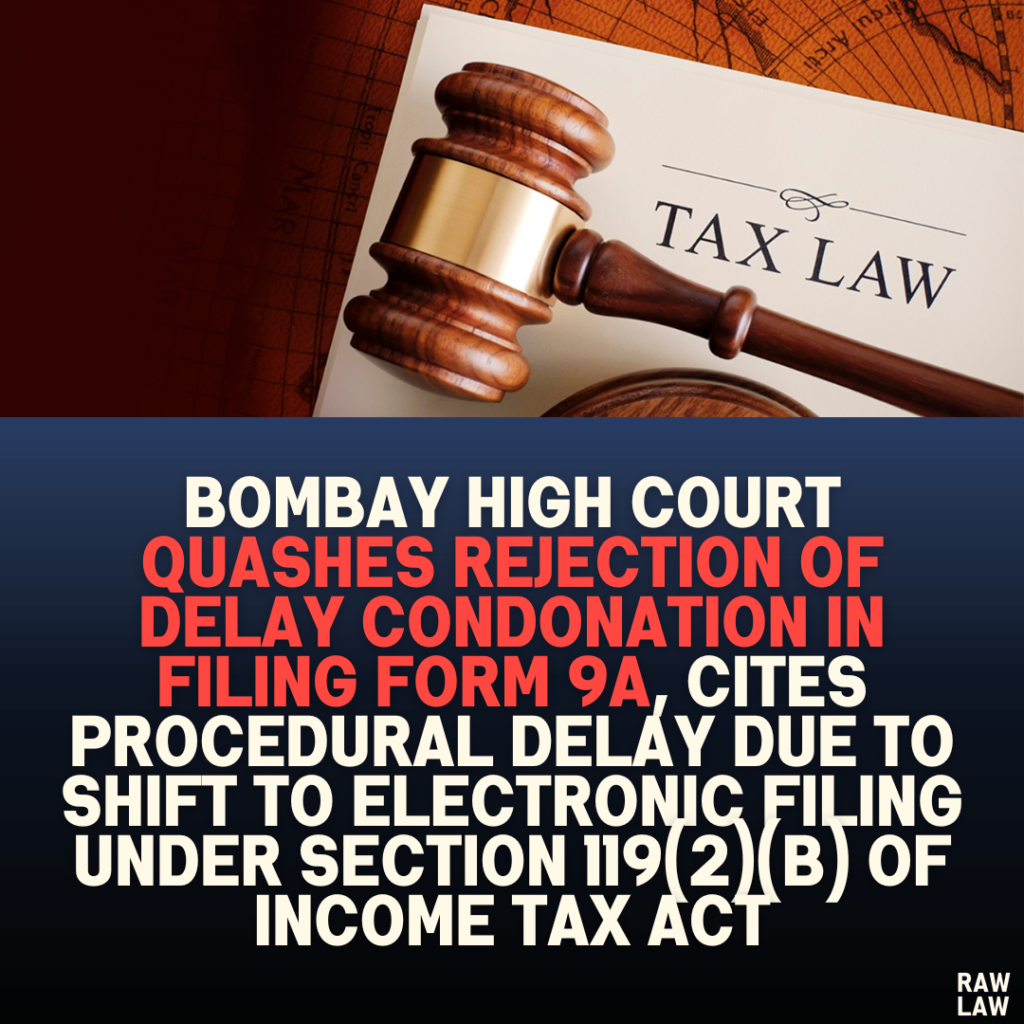The Bombay High Court allowed the petition, quashing the Income Tax Commissioner’s order dated September 28, 2023, which rejected the condonation of a 799-day delay in filing Form 9A by the Nav Chetna Charitable Trust. The Court held that the delay was procedural and bona fide, emphasizing the need for statutory discretion under Section 119(2)(b) of the Income Tax Act, 1961, to mitigate genuine hardship.
Facts:
- Petitioner’s Background: Nav Chetna Charitable Trust, registered under Section 12A of the Income Tax Act, operates several educational institutions in Mumbai and claims exemption under Section 11 of the Act.
- Return of Income: The petitioner filed a Nil return of income for AY 2017-18 under Section 139(1) on October 12, 2017, later revising it on December 29, 2018, and claiming deductions for depreciation and capital expenditure.
- Delay in Filing Form 9A: Due to a shift from manual to electronic filing procedures, Form 9A was filed belatedly on December 20, 2019, after CBDT Circular No. 30/2019 extended the deadline.
Issues:
- Was the rejection of the delay condonation application by the Income Tax Commissioner legally justified under Section 119(2)(b)?
- Did the petitioner demonstrate a reasonable cause for the delay in filing Form 9A?
Petitioner’s Arguments:
- Bona Fide Delay: The delay was procedural, caused by the shift to electronic filing, and not intentional or deliberate.
- Statutory Discretion: The CBDT circulars and Section 119(2)(b) empower the Commissioner to condone delays to mitigate hardship.
- Compliance Efforts: The petitioner filed the form immediately after the CBDT’s extension and submitted additional supporting documents during the proceedings.
Respondent’s Arguments:
- Procedural Lapse: The delay in filing Form 9A was not a mere procedural lapse but a significant non-compliance.
- Incorrect Claims: The petitioner incorrectly claimed depreciation and capital expenditure deductions, which were disallowed during the assessment.
- Lack of Proof: The petitioner failed to submit adequate documentation supporting the delay.
Analysis of the Law:
- Section 119(2)(b): Empowers authorities to admit delayed applications to prevent hardship if the delay is bona fide.
- Circulars Issued by CBDT: Circulars Nos. 7/2018, 30/2019, and 6/2020 extended deadlines and authorized the condonation of delays for AYs 2016-17 to 2018-19.
- Judicial Precedents: Decisions such as Jyotsna M. Mehta v. PCIT and Bar Council of India v. CIT (Exemptions) emphasized a liberal interpretation of condonation provisions.
Precedent Analysis:
The Court referred to:
- Bar Council of India v. CIT: Recognized the intent of Section 119(2)(b) to address hardships caused by procedural delays.
- Jyotsna M. Mehta v. PCIT: Allowed condonation for delays caused by bona fide mistakes by Chartered Accountants.
- Al Jamia Mohammediyah Education Society v. CIT: Delay due to oversight by professionals was condoned.
Court’s Reasoning:
- Bona Fide Conduct: The petitioner’s immediate action after the circular demonstrated good faith.
- Technicality vs. Justice: The Commissioner’s approach was hyper-technical and failed to consider legislative intent to prevent hardship.
- Statutory Intent: Section 119(2)(b) aims to address genuine hardships and cannot be rendered ineffective by rigid interpretations.
Conclusion:
The Court quashed the impugned order, holding that the Commissioner failed to exercise statutory discretion properly. It directed the respondent to condone the delay and accept the belated Form 9A for AY 2017-18.




Pingback: Bombay High Court Upholds Partial Eviction to Address Bona Fide Need: Balances Landlord’s Right and Tenant’s Hardship in Dispute Over Dairy Farming Premises Under Maharashtra Rent Control Act - Raw Law
Pingback: Supreme Court Restores Specific Performance with Enhanced Consideration: Balancing Equity and Law in Property Agreements While Addressing Buyer’s Legal Rights and Seller’s Familial Hardship Under the Specific Relief Act, 1963 - Raw Law
Pingback: Supreme Court Quashes Termination of Long-Serving Ad-Hoc Workers, Orders Reinstatement and Regularization of Services: Principles on Irregular Appointments Clarified - Raw Law